The first days in the development team - as it happens with us
When you are just going to enter a new job, you want to imagine in detail what is waiting for you. In this post I will tell you how the first working day and the first weeks in our team are usually built, and also mention a few myths about Avito.

First day
On the first working day, newcomers arrive at the office by 10 am. The important part, without which it is impossible - the signing of documents and reading internal regulations. Then for new employees conduct safety training. After the formalities are finished (I will not lie, this is not fast and takes about two hours), the more pleasant part of my acquaintance with the office begins. All beginners are given a velcom set:
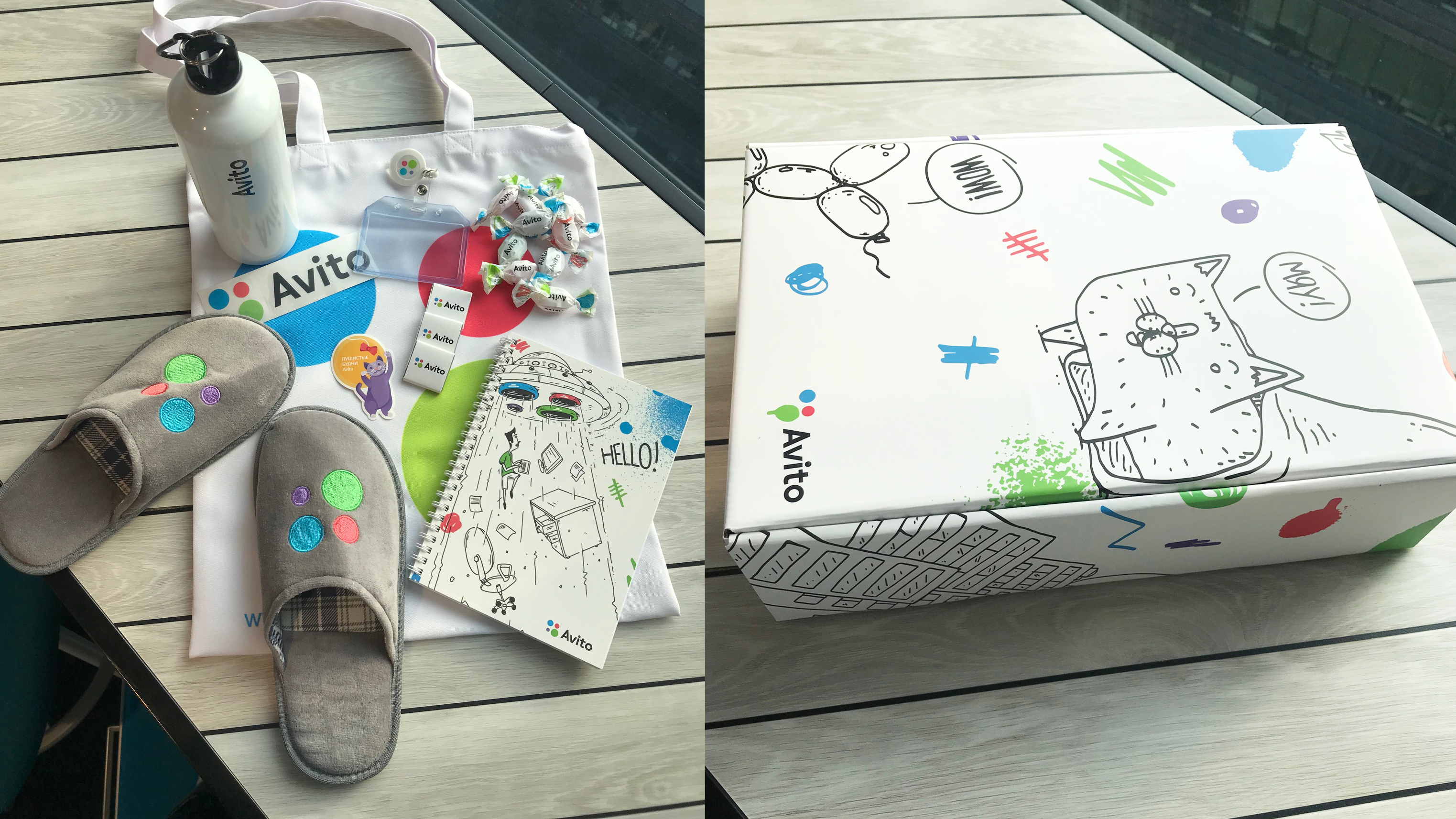
Inside - a notebook, branded bag-shopper, flask for drinks, sweets and slippers (to immediately feel at home). After that, the recruiter, who worked with the employee, conducts a tour. (If interested, a large photo report from the office can be viewed here ).
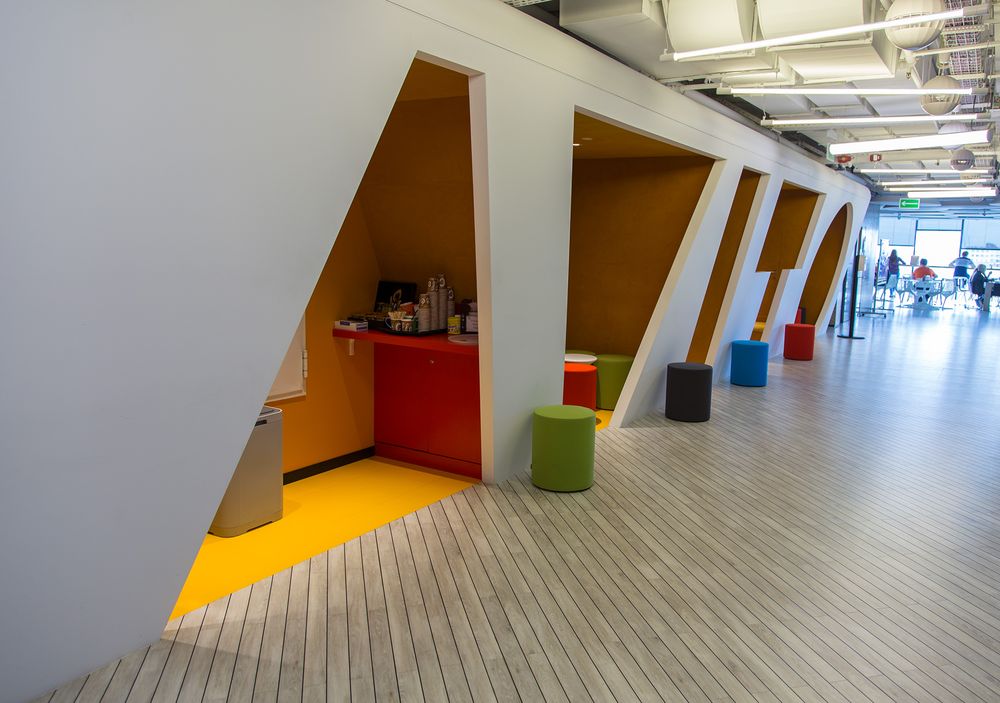

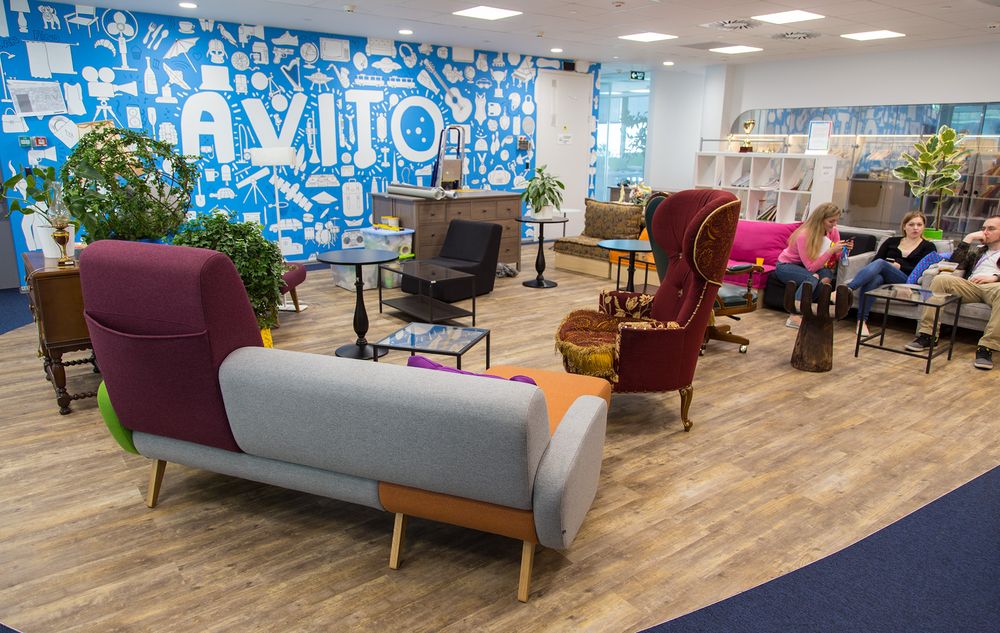
At the workplace, a colleague sets up a laptop, creates the necessary accounts. By the way, here are our main working tools:
- corporate instant messenger - Slack;
- task trackers - Jira, Trello;
- knowledge base and documentation - Confluence;
- analytics - Tableau;
- VCS - Git (Bitbucket Server);
- CI - TeamCity.
(You can learn more about the processes and standards in the development team in our playbook on GitHub ).
In the first days of work, a novice is assigned a mentor from a team - as a rule, it is one of the senior developers. Mentor answers all questions related to work, tools and processes. In general, you can count on the support of the whole team: without a company for lunch (if you need one), they will not leave either. For other hobbies there are also accomplices - my colleagues play mafia, football, marathons, play music ...
First weeks
On the first day of work, a novice is sent a letter with materials on Avito's history, about how the life and processes in the company are organized. In the first week, there is a meeting with a colleague from HR who can answer additional questions - for example, about LCA, training. And about all that is important and interesting.
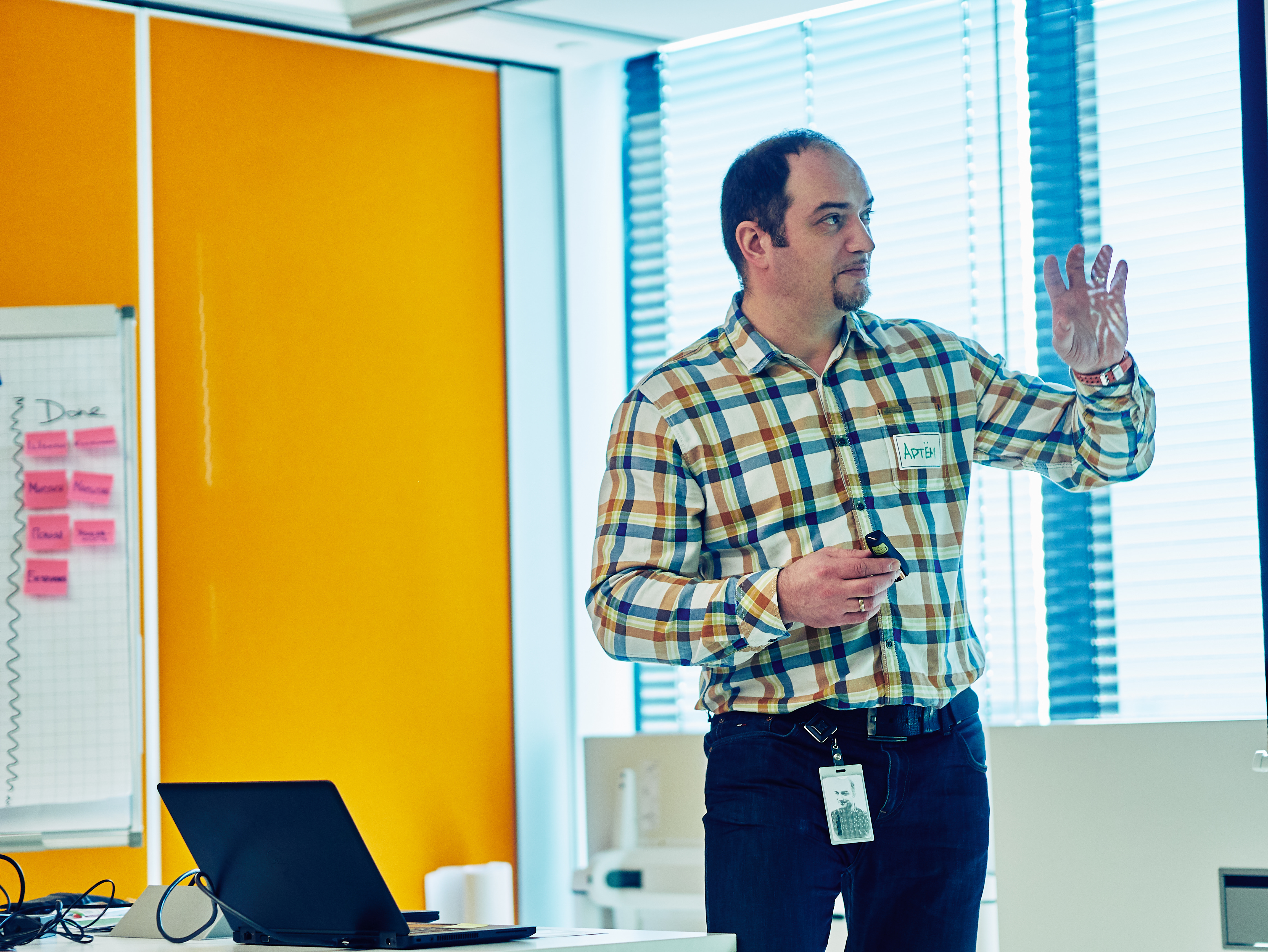
During the first two weeks, the newcomer gets a welcome training on the business and culture of Avito. On it are colleagues from the departments of product, design and HR. They tell about the structure of business, about how we measure the effectiveness of our work and what values we focus on in the decisions we make and the projects we implement.

After a month and a half of work, a welcome meeting for new colleagues is held by the Avito CEO.
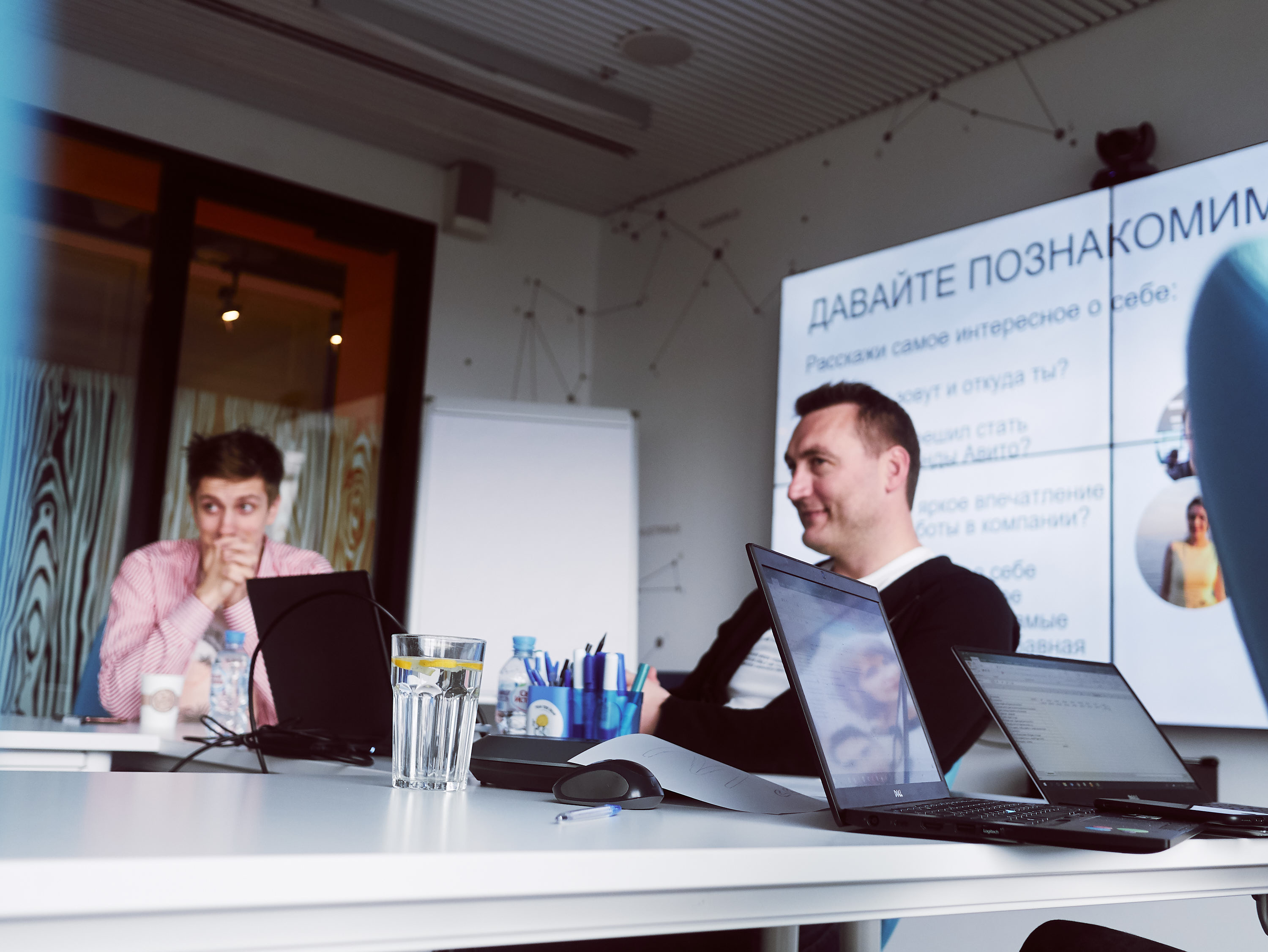
Probation
As long as the trial period lasts, colleagues try to help the newcomer. About once every two weeks (more / less often - depending on the team), the manager holds personal meetings. On them you discuss current successes and failures, tasks for the sprint and quarter and general directions of professional development.
As a rule, the beginner knows about the results of the probationary period in advance, so no nerves. In some cases, the criteria for its passage are discussed in advance. For example:
- to conduct at least one interview in the algorithmic section,
- make some useful commits to the team repository with the Go service,
- go through a personal Performance Review process and get a rating of no less than “meets expectations”.
In general, my colleagues try to minimize nervousness and give all the answers in advance.
Impressions of colleagues. Direct speech
I asked my colleagues to share their impressions of the first days of work and talk about what they were wrong about, until I met Avito personally.
Describing the general process of interviewing is an impossible task for one post, just as it is impossible to give an average impression of the first days of work, therefore here there are only special cases, thoughts, emotions and stories.
Recall the interview. How did everything go? Are recruiters caring? Tasks norms?

Ivan Lukyanov, head of unit development:
Interview, and especially the level of knowledge of the interviewee, was for me one of the decisive factors when making an offer. I was looking for a place where I could learn a lot from my colleagues, and here the bar was very high.
The recruiters were more than caring - at my request, they appointed an emergency final interview (I had one offer and I was in a hurry to get a second from Avito), and we ordered a second tour around the office. All is well, in general.

Victor Shitkovsky, server side developer:
The interview is more than adequate. During the technical part, I did not have to write a single line of code, I had enough conversations with future colleagues. But here, apparently, the specifics affected: I am engaged in supporting and finishing the search infrastructure. About round hatches did not ask.

Daniil Volynkin, developer at the Data Platform:
At the interview with HR, there were no “favorite” brain teasers, but the technical one was rather wide in the regions and long.

Antonina Palchikova, Testing Specialist:
I remember that there were three meetings. The first was with the head of testing - she answered about 90% of the questions, he also gave details about the working conditions and about the international ISTQB certification, which was the condition for passing a trial period in my specialty. This motivated me very much to come to work in Avito.
First impressions about the development in Avito. Stack, approaches, what is good, what is bad, what is strange?

Ivan Lukyanov, head of unit development:
On the one hand, monolith on php and legacy code. On the other hand, kubernetes, machine learning, google microservices, nosql storage and highload. Constantly you have to learn something, you always have the opportunity to try yourself in the new. At the same time, high-level specialists work in each direction in the company, there is an opportunity to consult with the best.

Victor Shitkovsky, server side developer:
The main development - separately, Sphinx and c ++ - separately :-)

Ekaterina Izaak, Testing Specialist:
For the first time I work in a company with well-built development processes.

Antonina Palchikova, Testing Specialist:
The technology stack varies greatly from unit to unit, but this is not at all bad and can be very useful.

Igor Dolgiy, head of unit development:
The quality of the code in the Avitov monolith is much higher than I expected, and than in those Legacy monoliths that I saw before. It's also fun to see the 2013 committees in Blame as the current development directors.
Remember your impressions of the first days of work

Ivan Lukyanov, head of unit development:
The first impression is the office. I took the laptop and went to some far corner, every time a new one, in order to work in a new environment. In general, he mastered it with pleasure. In principle, I still continue to do so, except perhaps less often.
The second impression is the team. In the breaks between work, people discussed work, it was very motivating, plus it was a great contrast to past work.
The third impression is, of course, burrows. The burrows are beautiful.
But seriously, when the first enthusiasm from the holes subsided, it became clear that the most important thing in Avito was the focus on the good and the meaning of what you were doing. As a result, for example, in Avito you can already influence the product and processes from day one. Your arguments will be heard, especially if you are ready to propose solutions.

Ekaterina Izaak, Testing Specialist:
A cool office, a bunch of different buns - food, even breakfast on Fridays, fruit, massage chair, free yoga - a fairy tale! Well, and a bunch of incomprehensible tasks)).

Igor Dolgiy, head of unit development:
We have a lot of things that a newcomer should be familiar with - OKR , organizational structure, technology stack, code styles, monitoring and so on. I actually got to the code only on the third day. In general, I can say that the number of meetings and events related to employee training in Avito is on average much more than that of a developer in most other companies. This is initially startling.
Adaptation in the team, welcome-meeting - how do you like it all?

Ivan Lukyanov, head of unit development:
Welcome-meetings with Vladimir Pravdiv made a great impression. The fact that the CEO of such a large organization takes the time to talk with each newcomer, to tell about himself and the company, says that much attention is paid to the common culture in the company. So it turned out in the end.

Victor Shitkovsky, server side developer:
With the adaptation in general, there were no problems. Welcome-meetings are also interesting: they tell about the history of the company, about its goals for the future. All newcomers are invited to talk about themselves. For the harsh developers, perhaps this all looks a bit naive, but I was normal.

Daniil Volynkin, developer at the Data Platform:
Perfectly! Colleagues showed and told everything at once. The confluence was written in detail what they did not mention. And at the training I also learned a lot about the company. In fact, a very important thing. Understanding where you work and where your company is heading increases the comfort and awareness of what you are doing.

Ekaterina Izaak, Testing Specialist:
The new team is always difficult for me, the welcome-meetings helped a little in joining the company).

Igor Dolgiy, head of unit development:
Wellcome meetings did not greatly affect the adaptation. In general, I can easily adapt, but there is a nice feature - in Avito, on most issues, the routing is clear: who to go to and what to negotiate.

Antonina Palchikova, Testing Specialist:
I don’t know how the adaptation took place in the team, it seems that I have been here for a very long time. In general, it is very useful and provides an opportunity to get acquainted with the values and historical prerequisites for the development of Avito, as well as with the future, at that time, colleagues :)
Your biggest misconception about Avito

Ivan Lukyanov, head of unit development:
I did not know anything about the development in Avito, but for some reason, in my heart I was sure that the programmer’s duties here included the moderation of ads for selling laminated sofas. It turned out that most of the ads are moderated by robots (but what they don’t cope with is the moderation team ), and Avito is one of the best jobs on the Russian market.

Daniil Volynkin, developer at the Data Platform:
A typical misconception, probably: before you have an interview, I thought that there were about twenty people working here.

Igor Dolgiy, head of unit development:
What Avito is written in Perl.
Note: our tech radar can be viewed here and on Stackshare .

Antonina Palchikova, Testing Specialist:
That Avito is a company that is not my dream (at the time of the offer, I thought that the dream company for me is a completely different company).
Results
In the article I tried to give a generalized picture of what the first days of work look like for beginners in Avito. Ask if something else is interesting - I will try to answer. Perhaps colleagues will complement me in the comments: everyone has their own impressions. Well, the adaptation process itself is gradually changing, we are trying to improve it so that everyone is comfortable.
')
Source: https://habr.com/ru/post/427837/
All Articles
